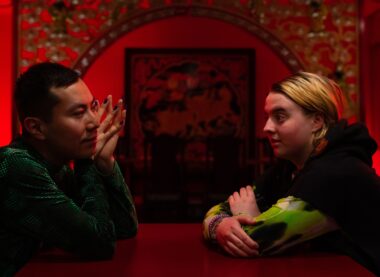Hospitals are unusually liminal spaces. The halfway point between a moment of brokenness and the rest of our lives, almost no amount of time in them ever feels quite as real or grounded as the every day outside. Time seems almost to stop, contained in that space. I’ve spent a great deal of my life in and out of hospitals, relearning basics of life most people take for granted and never have to think about, and the mood of being there has always felt a little hard to put my finger on. Some of my core memories and favorite people were made and met there, inextricably woven together with medical anxiety. In small ways and big, the staff and volunteers of the hospital I most frequented made me who I am.
It’s been a long time since I’ve seen a film accurately capture the vaguely out-of-time-and-place feeling of being in a hospital environment for an extended period of time, but something about QUEENS OF THE QING DYNASTY comes very close. That feeling of life moving on outside the walls around you, without you, that you’re expected to simply step seamlessly back into, can be overwhelming. Just as overwhelming are the connections you make while there. Written and directed by Ashley McKenzie, QUEENS OF THE QING DYNASTY is the story of Star (Sarah Walker), a suicidal teen recovering in the hospital, and An (Ziyin Zheng), a medical student assigned to watch over her. The two develop a microcosmic world of trust and secrets and an expansive connection to one another, or so it feels. The roles they play are static yet ephemeral, and their relationship becomes one of queer exploration atypical and difficult to explain. Star is enraptured by An, entrusting them with secrets “no one likes to hear” in moments of vulnerability that beg for connection beneath the surface.
Watching QUEENS OF THE QING DYNASTY is a transportive, almost out-of-body experience. There is so much of these characters laid bare on the screen—not all of it good or comfortable—and played so effectively. Both Walker and Zheng are magnetic to watch. Their chemistry as the film goes on always feels a little like a tightrope walk you can’t quite bring yourself to look away from. The dynamic at play feels so raw, equal parts vulnerable and, at times, almost manipulative. Star opens herself like a wound to An, to see how much of her they can take before drawing the line and letting her go. An, for their part, seems to want to draw something out of Star. Not information; more like a piece of herself normally kept in the dark.
QUEENS OF THE QING DYNASTY is a difficult film to place. It’s queer. It’s heartbreaking. It could easily be perceived as somewhat awkward, tonally, if you do not lend yourself fully to the world it puts you in. But it is also a uniquely poignant look at the worlds and connections we create when much about the world around us doesn’t make sense. It’s an interesting look at the different perceptions we can hold of people and the world. An is there in that hospital because they want to be, free to leave at any time and subject to almost nothing of consequence. Star is there because she must be. And while there is an element of freedom at play, there is also the vague sense of a trap. But which world is doing the trapping? And how powerful are the connections that free us?
Tags: Ashley McKenzie, LGBTQIA+ Drama, Queens of the Qing Dynasty, Queer, Sarah Walker, Ziyin Zheng



No Comments